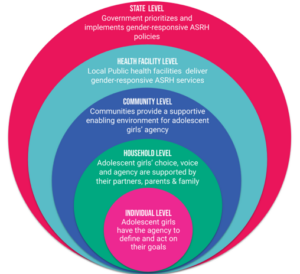Amina Abdallah Misima is very familiar with the Sixth Commandment.
“Thou shalt not commit adultery.”
She knows it because more than a few health care providers in Dar el Salaam, Tanzania, have pulled out well-worn copies of the Bible from their desks and flipped to the page when the 18-year-old visited their clinic to inquire about getting an IUD.
Through its Adolescents 360 (A360) project, PSI is working to increase voluntary, modern contraceptive use among girls age 15-19 in Ethiopia, Nigeria and Tanzania. The teen pregnancy rate in Tanzania remains one of the highest in the world, at 19% (for comparison, the United States is at an all-time low of 2%).
A360 is taking an innovative approach by developing solutions in tandem with the girls they’re aiming to serve.
Amina is one of 12 young women who have been trained by PSI Tanzania to screen providers and identify ones who are “positive” to youth. She role-played extensively at the office before heading into her first clinic. She has her story down pat.
Entering a clinic, she tells the provider “I’m here for counseling.’” Under the pseudonym Janet, she is an 18-year old girl who has a boyfriend, “but he doesn’t like to use condoms.”
“I heard from a friend about IUDs,” she tells the health care professional, “and she told me to get one for myself. I’d like to learn more.”
How does a positive provider respond?
“It is like talking to a friend,” she says. A particularly well-informed one.
“The provider will start giving me information about all contraceptive methods available. She’ll talk about the side effects and benefits. Sometimes she’ll ask me about my boyfriend but in a friendly way. She doesn’t shake her finger at me and tell me not to have a boyfriend!”
There’s no pressure to make an immediate decision. If a girl chooses to take up one of the methods, the provider will take care of it. If–like Janet–she’d rather think about it, “The provider says, ‘No problem. Consider your decision and come back another day.”
And what about a negative provider who meets “Janet”? Amina’s come across many.
“They might be standing in front of their clinic talking to other people. When you tell them you’re there for counseling they’ll say ‘You can speak to me right here.’”
Or “Sometimes they’ll take you back to their office, but they’re playing with their phones the whole time you’re talking.”
Or “She’ll say, ‘Since your friend is using an IUD, lay there on the bed, let me insert an IUD and then you can go home.’”
Or “You’re too young to have sex.”
Occasionally providers will try to charge girls more to give them contraception telling them, “I’ll do it, but I’ll charge you extra and it will remain a secret between us.”
And then there’s the Bible.
PSI screeners like Amina have discovered 80% of the providers fall into the “negative” category. In a country where it is difficult for teenage girls to get accurate information about the changes in their bodies and how to prevent pregnancy, turning to parents for help is rarely an option. And it can be tough to muster up the courage to visit a health clinic if she thinks she’ll be judged for having sex. Once a girl has a negative experience, the chances she’ll take up a contraceptive method are slim.
When screeners identify “positive” providers, PSI cultivates them and trains them as leaders in their community.
Besides training health professionals, the A360 project involves young people like Amina as research and design partners.
Amina feels empowered in her role. She is confident her opinions are valued by PSI Tanzania staff. And she loves being the expert among her friends. She talks to them about sex and teen pregnancy all the time–especially how to get around the obstacles.
“I tell them, if your boyfriend doesn’t want to use a condom, you can get contraception and he will never know.”
“And then I refer them to a positive provider to find out more.”
Adolescents 360 (A360) is a four-and-a-half year initiative co-funded by the Bill & Melinda Gates Foundation and the Children’s Investment Fund Foundation (CIFF). The project is led by Population Services International (PSI) together with IDEO.org, University of California at Berkeley Center on the Developing Adolescent, the Society for Family Health Nigeria, and Triggerise. The project is being delivered in Ethiopia, Nigeria and Tanzania, in partnership with local governments, local organizations, and local technology and marketing firms. In Tanzania, A360 is building on an investment and talent from philanthropist and design thinker Pam Scott.



